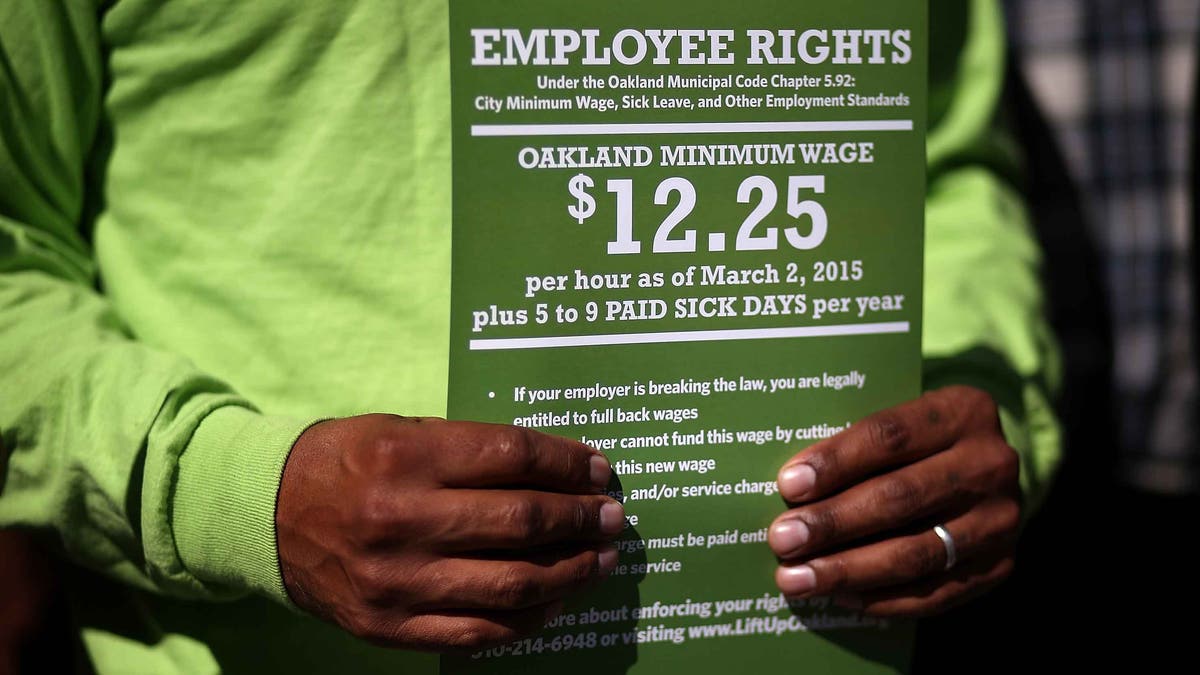
OAKLAND, CA - FEBRUARY 27: A supporter of Oakland's minimum wage increase holds a sign during a celebration rally outside of Oakland City Hall on February 27, 2015 in Oakland, California. Dozens of minimum wage workers gathered on the steps of Oakland City Hall to celebrate a $3 increase in the city's minimum wage to $12.25 an hour. Voters passed measure FF in November with 81 percent voting in favor of the wage increase. The new wage goes into effect on March 2. (Photo by Justin Sullivan/Getty Images) (2015 Getty Images)
The discussion on raising the federal minimum wage, one of the most polarizing in the political field, has recently been highly featured during forums and debates. However, the issue – apart from being used erroneously as a judge of moral character – is often one-sided.
Supporters of a Washington-mandated wage levels have it backwards: it’s those who support a federal minimum wage increase who want to sacrifice those looking to enter the job market – and those most at risk of losing their jobs – for those already in it.
Wages will not rise if the cost of regulations are forcing companies to shift profits away from workers’ wages and toward government mandates.
As the non-partisan Congressional Budget Office (CBO) explains, while some workers would receive higher pay, jobs for many low-wage workers would probably be eliminated. The impact of a minimum wage increase would be particularly severe for Hispanic immigrants, who tend to be concentrated in low-wage occupations.
There are 519,000 Hispanics living on federal minimum wage, that’s 17.3 percent of the working population, according to the Bureau of Labor Statistics. However, raising the minimum wage would not do anything to help the workers who need the most assistance. As appealing as a federal wage mandate sounds, it's minority groups like this one who face the backlash that will inevitably follow.
U.S. Hispanics who desperately want full-time employment are already disproportionately forced into part-time jobs, according to the most recent study from The LIBRE Institute. This is a community that has first-hand experience on job loss due to federal regulation, such as the Affordable Care Act. Under the healthcare law, an estimated 2.5 million people have lost their full-time jobs, and there has been a significant cut in work hours from many employers nationwide.
The truth is, Washington can’t deliver high wages – or wealth in general – just by the stroke of a pen. As the CBO makes clear, Washington can create winners and losers, leading some workers to get raises, while others get pink slips.
Wage increases come with real, private-sector led economic growth — something too many in Washington have given up on. The headlines have recently focused on several major national companies that have raised wages across the board. Some companies adjusted due to profits, other from workers claims. That’s great news. In a free market, change comes naturally to satisfy needs.
The power to increase wages should rely on individuals, not government.
Nevertheless, under President Obama’s administration, new regulations imposed by the White House are costing our economy over $80 billion every year — an extremely heavy burden at a time when new business startups have dropped to a historic low. Wages will not rise if the cost of regulations are forcing companies to shift profits away from workers’ wages and toward government mandates.
When Washington seeks to boost take-home pay, policymakers should look at proposals that limit the negative impact on small businesses. A recent report by the Manhattan Institute, “The Wage Subsidy—A Better Way To Help The Poor,” explains why a wage-subsidy program would be a better tool to help the working poor than a higher minimum wage or even the popular Earned Income Tax Credit (EITC), a refundable tax credit for low-to moderate-income working individuals.
The report explains that unlike raising the minimum wage, which puts an unfair burden on the shoulders of employers and harms low-income consumers through higher prices, a wage-subsidy program would avoid these problems because it would be paid collectively by society through its tax base, not only by employers. Making all proponents of having government make a mandate, put their money where their mouth is.
The discussion on minimum wage may be polarizing but it’s one that needs to take place. Failing to see either side of the debate or demonizing those who don’t agree with your views will just drag out a consensus on the issue. Decisions on government regulations should be supported by research and analysis. On the case for a federal mandate on a minimum wage increase, change is best when it comes by freedom of choice.








































